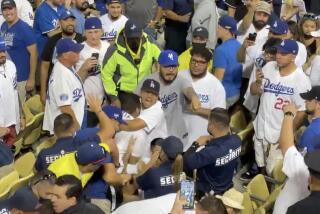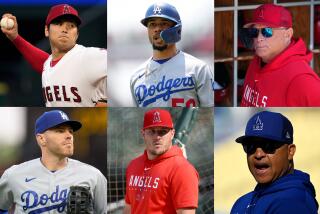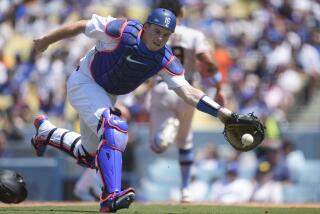Dodgers and Giants -- rivals, not enemies
What a paradox that as the NFL barrels into its season with the reputation as the sport of violent plays and player concussions, it is the gentleman’s game, baseball, that death visited -- not on the field but far afield, among the fans.
The Dodgers and the Giants have a deep and rivalrous history, one that survived the trip from the East Coast to the West Coast, when the Brooklyn Dodgers uprooted themselves to became the Los Angeles Dodgers and the New York Giants became the San Francisco Giants. A crosstown sports feud, Ebbets Field versus the Polo Grounds, became a cross-state one, Southern California versus the Bay Area, palms versus pines.
Now the two cities have latched onto the tragic symmetry between the near-fatal 2011 attack on Giants fan Bryan Stow, a firefighter whose life will never be the same, and the fatal stabbing this week of Jonathan Denver, a plumber’s apprentice and the son of a Dodgers security guard, whose life is over.
Denver was killed several blocks from the Giants’ ballpark about 90 minutes after a game the Dodgers lost. They lost again to the Giants on Thursday night, in a game that followed a moment of silence in Denver’s memory. Dodgers manager Don Mattingly reminded folks once again that it’s a game, just a game, and to leave the hostility there, on the field.
Every sport has its rivalries, some of them good natured, others more vehement. Mercifully, we haven’t had the killer melees that prompted some soccer stadiums around the world to erect chain-link fences between seating areas in the stands, to separate one team’s fans from another’s.
With any of these feuds, it’s hard to tell how much is sports showmanship, like the posturings of professional wrestling, and how much is real antipathy.
Maury Wills, the Dodgers shortstop who later coached base runners for the Giants, once said that “it’s as intense as any rivalry that ever existed in baseball.”
“Willie Mays said the rivalry was not as strong when both teams moved to the West Coast (in 1958), but I disagree … it was like war.”
The sentiment did not go unshared. A onetime Giants pitcher named John Montefusco believed that a lot of his teammates “really hate the Dodgers. You hear guys here say, ‘We don’t care who wins the pennant, as long as it’s not the Dodgers.’ We’re sick of the Dodgers and Hollywood.”
In 1981, in Candlestick Park, Dodgers player Reggie Smith charged toward the stands to get at a fan who had thrown a batting helmet at him. Smith was marched off the field by cops, who also dragged away a couple of fans.
In 1978, a “bellicose” San Francisco crowd threw nails, rocks, beer cans, golf balls and tomatoes at Dodgers outfielders. One fan burned a Dodgers pennant in the stands. The announcer warned them that if their antics didn’t stop, the game would.
These may be just differences in degree, not in kind, from other baseball rivalries. It never seemed to approach the mayhem associated with the Oakland Raiders fans. In 1990, during the Raiders’ mercifully brief incarnation as the Los Angeles Raiders, a Pittsburgh Steelers fan who happened to be walking through the cheap seats at the Coliseum in the fourth quarter got severely kicked and beaten by a Raiders fan. The Raiders and the Coliseum didn’t send so much as a get-well card, the victim’s father said. But the Coliseum did reduce the size of the cups of beer it sold.
There was an air of menace about the Raiders, and frankly, that may have been a selling point for some of their fans.
Yet the L.A.-S.F. enmity predates the baseball teams’ move west. L.A. surpassed San Francisco as the state’s most populous city nearly 100 years ago, and while San Francisco, thanks to journalists like the late Herb Caen, tried to keep up the feud, L.A. long ago set itself against its fitter rival, New York, and began to regard San Francisco with affection and bemusement, like a scrappy little brother trying bravely to punch above his weight.
The baseball diamond, though, is a great equalizer, and it’s there that two great cities can take on each other, and join forces to quote the Dodgers’ Vin Scully, a baseball game observation that can serve as an admonition for the fans too: “Good is not good when better is expected.”
And we do expect better.
ALSO:
Steve Soboroff, citizens’ voice on the LAPD
The rich can still skip Disneyland lines; just pay Disney.
Follow Patt Morrison on Twitter @pattmlatimes
More to Read
A cure for the common opinion
Get thought-provoking perspectives with our weekly newsletter.
You may occasionally receive promotional content from the Los Angeles Times.







